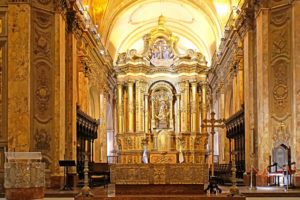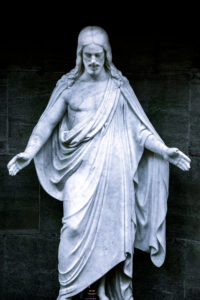Jesus calls us o’er the tumult of our life’s wild restless sea;
day by day his voice still calls us saying, ‘Christian, follow me.’
As of old Saint Andrew heard it by the Galilean lake,
turned from home and work and kindred, leaving all for Jesus’s sake.
Jesus calls us from the worship of the vain world’s golden store,
from each idol that would keep us, saying, ‘Christian, love me more.’
In our joys and in our sorrows, days of toil and hours of ease,
Jesus calls, in cares and pleasures, ‘Christian, love me more than these.’
– Cecil Francis Alexander (1818-1895), From “Jesus calls us, O’er the Tumult” (1852)
 Last week we heard Jesus say to His Apostles, “If the world hates you, you know that it has hated Me before it hated you. If you were of the world, the world would love you as its own; but because you are not of the world, but I chose you out of the world, because of this the world hates you” (JN 15:18-19).
Last week we heard Jesus say to His Apostles, “If the world hates you, you know that it has hated Me before it hated you. If you were of the world, the world would love you as its own; but because you are not of the world, but I chose you out of the world, because of this the world hates you” (JN 15:18-19).
And in the Book of Matthew Jesus gives a longer pre-crucifixion charge to His Apostles that includes these words: “As you go, preach, saying, ‘The kingdom of heaven has come near.’ Heal the sick, raise the dead, cleanse those with leprosy, cast out demons. Freely you received, freely give. Do not acquire gold, or silver, or copper for your money belts, or a bag for your journey, or even two tunics, or sandals, or a staff; for the worker is deserving of his support. …
“Behold, I am sending you out as sheep in the midst of wolves; so be as wary as serpents, and as innocent as doves. But be on guard against people, for they will hand you over to the courts and flog you in their synagogues; and you will even be brought before governors and kings on My account, as a testimony to them and to the Gentiles. But when they hand you over, do not worry about how or what you are to say; for what you are to say will be given you in that hour. For it is not you who are speaking, but it is the Spirit of your Father who is speaking in you.
“Now brother will betray brother to death, and a father his child; and children will rise up against parents and cause them to be put to death. And you will be hated by all because of My name, but it is the one who has endured to the end who will be saved.
“But whenever they persecute you in one city, flee to the next; for truly I say to you, you will not finish going through the cities of Israel until the Son of Man comes” (MT 10:5-23).
Jesus even says, “Do not think that I came to bring peace on the earth; I did not come to bring peace, but a sword. For I came to turn a man against his father, and a daughter against her mother, and a daughter-in-law against her mother-in-law; and a person’s enemies will be the members of his household” (MT 10:34-36).
 What on earth is going on?! All this hatred, and yet when we think of Jesus we imagine a kindly and loving Man teaching radical forgiveness and perfect love. Whether the version of Jesus in your mind is pale church-Jesus with blue eyes and light-brown hair to His shoulders, or is the sweet young Mediterranean-looking Man that Jesus prefers to present to His astral visitors today, this notion that Jesus was hated when He was teaching on earth is hard to imagine. But when you read the Bible through, you are unceremoniously dumped from the archaic Old Testament Book of Malachi directly into the Gospel of Matthew, and you are suddenly in the presence of a modern young Man teaching primitives. Unless you are blind and deaf, you really cannot help seeing their cultural friction. Jesus is the Son of God! His coming was foretold as the Son of Man (see e.g. Ezekiel 33), and Jesus Himself claimed that designation. The cultural shock is at least as extreme as it would be if a Man from the far future were to land abruptly in Times Square today. The people around Jesus were living in the Iron Age, many of them illiterate, deeply clannish, and highly superstitious. They were heavily oppressed by Roman rule, by their own ruler Herod, and by the rule of their clergy. And in addition, there are some peculiarities about Jesus’s life on earth and about the life of His mother that my favorite blogger, Keith Giles, may just have nicely explained for us. Mother Mary and Jesus may in fact have been slaves.
What on earth is going on?! All this hatred, and yet when we think of Jesus we imagine a kindly and loving Man teaching radical forgiveness and perfect love. Whether the version of Jesus in your mind is pale church-Jesus with blue eyes and light-brown hair to His shoulders, or is the sweet young Mediterranean-looking Man that Jesus prefers to present to His astral visitors today, this notion that Jesus was hated when He was teaching on earth is hard to imagine. But when you read the Bible through, you are unceremoniously dumped from the archaic Old Testament Book of Malachi directly into the Gospel of Matthew, and you are suddenly in the presence of a modern young Man teaching primitives. Unless you are blind and deaf, you really cannot help seeing their cultural friction. Jesus is the Son of God! His coming was foretold as the Son of Man (see e.g. Ezekiel 33), and Jesus Himself claimed that designation. The cultural shock is at least as extreme as it would be if a Man from the far future were to land abruptly in Times Square today. The people around Jesus were living in the Iron Age, many of them illiterate, deeply clannish, and highly superstitious. They were heavily oppressed by Roman rule, by their own ruler Herod, and by the rule of their clergy. And in addition, there are some peculiarities about Jesus’s life on earth and about the life of His mother that my favorite blogger, Keith Giles, may just have nicely explained for us. Mother Mary and Jesus may in fact have been slaves.
Slavery was common in Biblical times. And as Keith’s source explains, the Greek word that Mary uses to identify herself to the Archangel Gabriel in the Gospel of Luke is the word for “slave.” As I first read Keith’s recent post on this topic and the Daily Beast article on which he draws, I realized that the point he was making explains a number of things about Jesus’s life on earth that have never before made sense to me, including this odd question about why Jesus was so much hated by some for preaching with authority, especially near the start of His ministry. As the son of a slave mother, Jesus would have been born a slave Himself; but a law passed when He was a child would have freed Him at the age of thirty… which would neatly explain why He delayed beginning His public ministry until He reached the age of thirty. Omigod. And as an observant Jew, Jesus should have been married in His teens, but oddly that seems not to have happened. As perhaps it would not have happened if He was a slave when He was a teenager. And this also might explain why, when there was no room for them in the Inn, a stable was thought to be sufficient shelter for a slave-mother who was about to give birth.
 And Joseph may have chosen not to marry a slave, even despite the Archangel Gabriel’s amazing announcement of the divinity of Mary’s coming child. And although Joseph may have had other children by Mary, he later may have instead married a free woman. Marriage for women in that time and place was an institution not much different from slavery, in any event. And if Mary was indeed a slave, that also might explain why Jesus from the cross asked His Apostle, John, to look after His mother (see JN 19:27), assuming that He could not be certain that his father would dependably care for His mother after His own death. As indeed Joseph did not, according to a close reading of the Gospel of Luke.
And Joseph may have chosen not to marry a slave, even despite the Archangel Gabriel’s amazing announcement of the divinity of Mary’s coming child. And although Joseph may have had other children by Mary, he later may have instead married a free woman. Marriage for women in that time and place was an institution not much different from slavery, in any event. And if Mary was indeed a slave, that also might explain why Jesus from the cross asked His Apostle, John, to look after His mother (see JN 19:27), assuming that He could not be certain that his father would dependably care for His mother after His own death. As indeed Joseph did not, according to a close reading of the Gospel of Luke.
But Joseph did give Jesus a good education, to prepare his enslaved but still beloved oldest son for His legal emancipation as an adult. And meanwhile, Jesus’s status as a bondsman in His youth would adequately explain what are called the “lost years” of His twenties, when He would have been an enslaved carpenter. And I do know Jesus now! If the Jesus that I know and adore was planning to be born into a lifetime to be lived in a place where a significant percentage of the population was enslaved, then He would have wanted to be born enslaved Himself. Of that, I have not the slightest doubt. When I asked my Thomas if all of this was true, his answer was, “Do you really have to ask?”
So I take this new evidence as probably true. It makes a puzzle-piece that fits the whole puzzle of Jesus’s earth-life so neatly! And the complexity that this new information adds to our study of the teachings of Jesus is of crucial importance. It adds a layer of deeper debasement to Jesus’s lived status, especially in His home community. And it is no wonder now that the clergy and everyone else of higher rank hated Jesus for speaking out as boldly and as radically as He did. It wasn’t just that Jesus regularly dined and socialized with the dregs of society, but many people knew Jesus to have been born into the dregs Himself. Who was He to be speaking so far above His social status? Even now, Jesus is almost unbelievably charismatic. And Thomas tells me that He always has been this way. So as soon as He was emancipated at the age of thirty, Jesus then began to teach. And almost right away He was drawing crowds that soon, incredibly, numbered in the thousands.
 “And Jesus returned to Galilee in the power of the Spirit, and news about Him spread through all the surrounding region. And He began teaching in their synagogues and was praised by all. And He came to Nazareth, where He had been brought up; and as was His custom, He entered the synagogue on the Sabbath, and stood up to read. And the scroll of Isaiah the prophet was handed to Him. And He unrolled the scroll and found the place where it was written:
“And Jesus returned to Galilee in the power of the Spirit, and news about Him spread through all the surrounding region. And He began teaching in their synagogues and was praised by all. And He came to Nazareth, where He had been brought up; and as was His custom, He entered the synagogue on the Sabbath, and stood up to read. And the scroll of Isaiah the prophet was handed to Him. And He unrolled the scroll and found the place where it was written:
‘The Spirit of the Lord is upon Me,
Because He anointed Me to bring good news to the poor.
He has sent Me to proclaim release to captives,
And recovery of sight to the blind,
To set free those who are oppressed,
To proclaim the favorable year of the Lord.’
And He rolled up the scroll, gave it back to the attendant, and sat down; and the eyes of all the people in the synagogue were intently directed at Him. Now He began to say to them, ‘Today this Scripture has been fulfilled in your hearing.’ And all the people were speaking well of Him, and admiring the gracious words which were coming from His lips; and yet they were saying, ‘Is this not Joseph’s son? ‘And He said to them, ‘No doubt you will quote this proverb to Me: “Physician, heal yourself! All the miracles that we heard were done in Capernaum, do here in your hometown as well.”’ But He said, ‘Truly I say to you, no prophet is welcome in his hometown. But I say to you in truth, there were many widows in Israel in the days of Elijah, when the sky was shut up for three years and six months, when a severe famine came over all the land; and yet Elijah was sent to none of them, but only to Zarephath, in the land of Sidon, to a woman who was a widow. And there were many with leprosy in Israel in the time of Elisha the prophet; and none of them was cleansed, but only Naaman the Syrian.’ And all the people in the synagogue were filled with rage as they heard these things; and they got up and drove Him out of the city, and brought Him to the crest of the hill on which their city had been built, so that they could throw Him down from the cliff. But He passed through their midst and went on His way” (LK 4:14-30).
 The last part of that passage never made sense to me before. But it makes absolute sense to me now! This was just Joseph’s son, the local carpenter’s boy, who was a slave until barely a season ago, now claiming to be the fulfillment of prophesy? No wonder they wanted to throw Him off a cliff and be done with Him! Jesus soon learned to speak perhaps a bit more circumspectly. But our knowing this additional aspect of His personal history does explain so much!
The last part of that passage never made sense to me before. But it makes absolute sense to me now! This was just Joseph’s son, the local carpenter’s boy, who was a slave until barely a season ago, now claiming to be the fulfillment of prophesy? No wonder they wanted to throw Him off a cliff and be done with Him! Jesus soon learned to speak perhaps a bit more circumspectly. But our knowing this additional aspect of His personal history does explain so much!
And knowing Jesus’s countrymen’s disdain for Him adds even more power to the scene where John the Baptist recognizes Jesus as God’s own Son. And John says, “I have the need to be baptized by You, and yet You are coming to me?” But Jesus, answering, says to him, “Allow it at this time; for in this way it is fitting for us to fulfill all righteousness.” Then John allowed Him. After Jesus was baptized, He came up immediately from the water; and behold, the heavens were opened, and He saw the Spirit of God descending as a dove and settling on Him, and behold, a voice from the heavens said, “This is My beloved Son, with whom I am well pleased” (MT 3:14-17).
Oh my, yes! If anyone around Him was going to be a slave, then the Jesus that I know and adore would have chosen to be born a slave as well. When He says in the Sermon on the Mount, “Blessed are the poor in spirit, for theirs is the kingdom of heaven” (MT 5:3) and “Blessed are the meek, for they will inherit the earth” (MT 5:5), Jesus well knows whereof He speaks, because He knows personally what it is to have been a slave-boy, once so belittled and so despised as to have felt Himself to be invisible.
 It is only late in my life that I am coming to see that I have had one great advantage in this lifetime. I have known since I was eight years old that of course there certainly is a God. If you, on this beautiful morning, still have the slightest doubt of that fact, please let me give you a decided skeptic’s personal assurance of at least this much. Oh yes, my treasured friend, there is a God indeed! Like Moses with his burning bush, I first encountered God when I was eight, which has let me spend the rest of my life happily figuring out all these details. But what I did not know until much later was that religion was going to turn out to be perhaps God’s enemy, and not God’s friend….
It is only late in my life that I am coming to see that I have had one great advantage in this lifetime. I have known since I was eight years old that of course there certainly is a God. If you, on this beautiful morning, still have the slightest doubt of that fact, please let me give you a decided skeptic’s personal assurance of at least this much. Oh yes, my treasured friend, there is a God indeed! Like Moses with his burning bush, I first encountered God when I was eight, which has let me spend the rest of my life happily figuring out all these details. But what I did not know until much later was that religion was going to turn out to be perhaps God’s enemy, and not God’s friend….
Jesus calls us: by your mercies,
Saviour, may we hear your call,
give our hearts in glad obedience,
serve and love you best of all.
– Cecil Francis Alexander (1818-1895), from “Jesus Calls Us, O’er the Tumult” (1852)































































